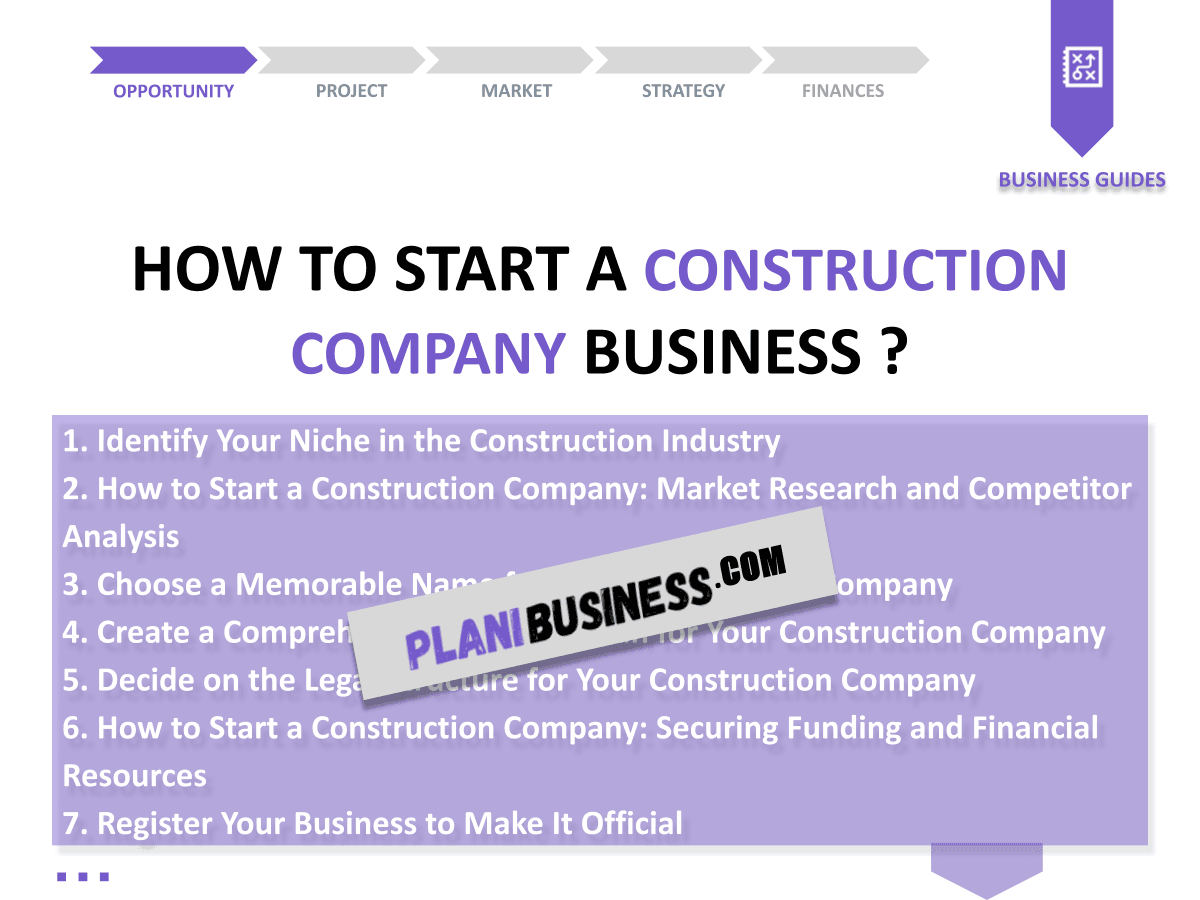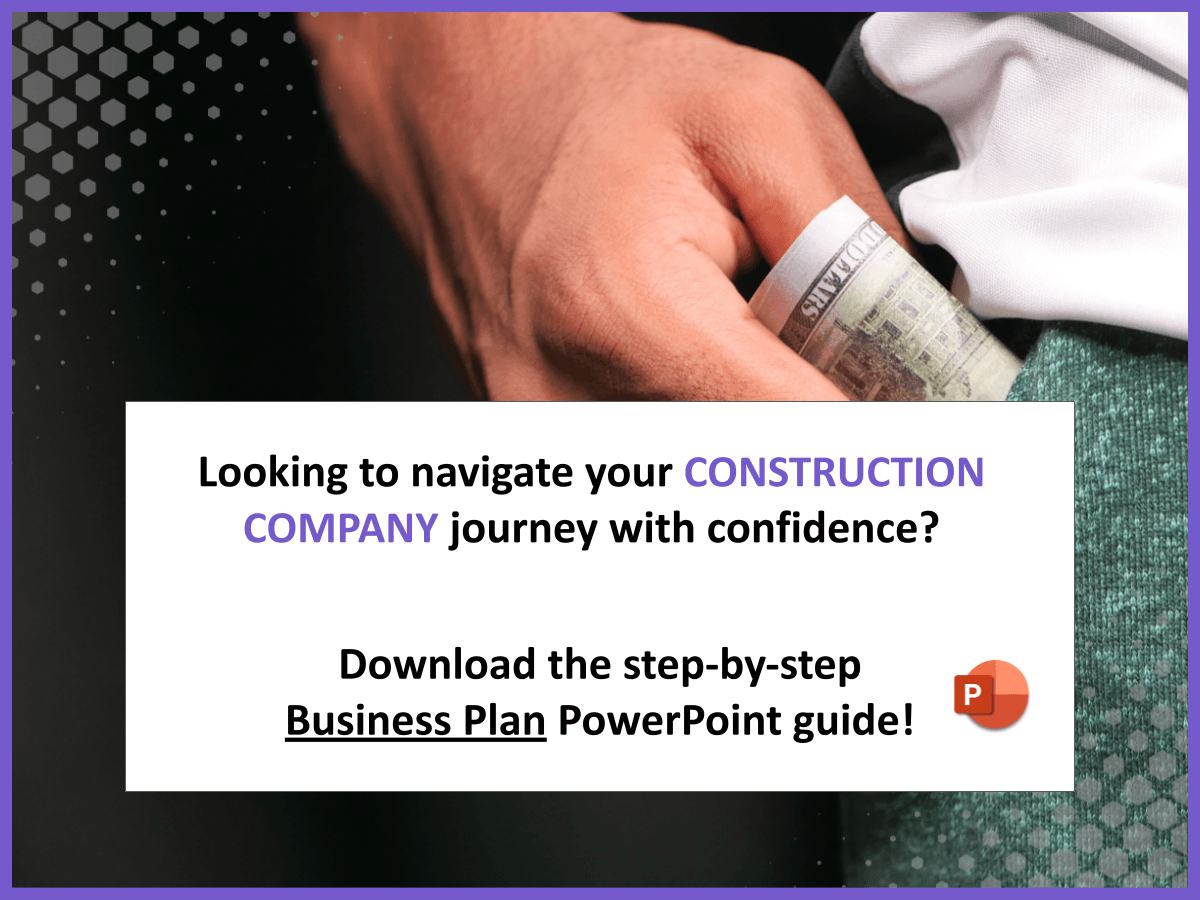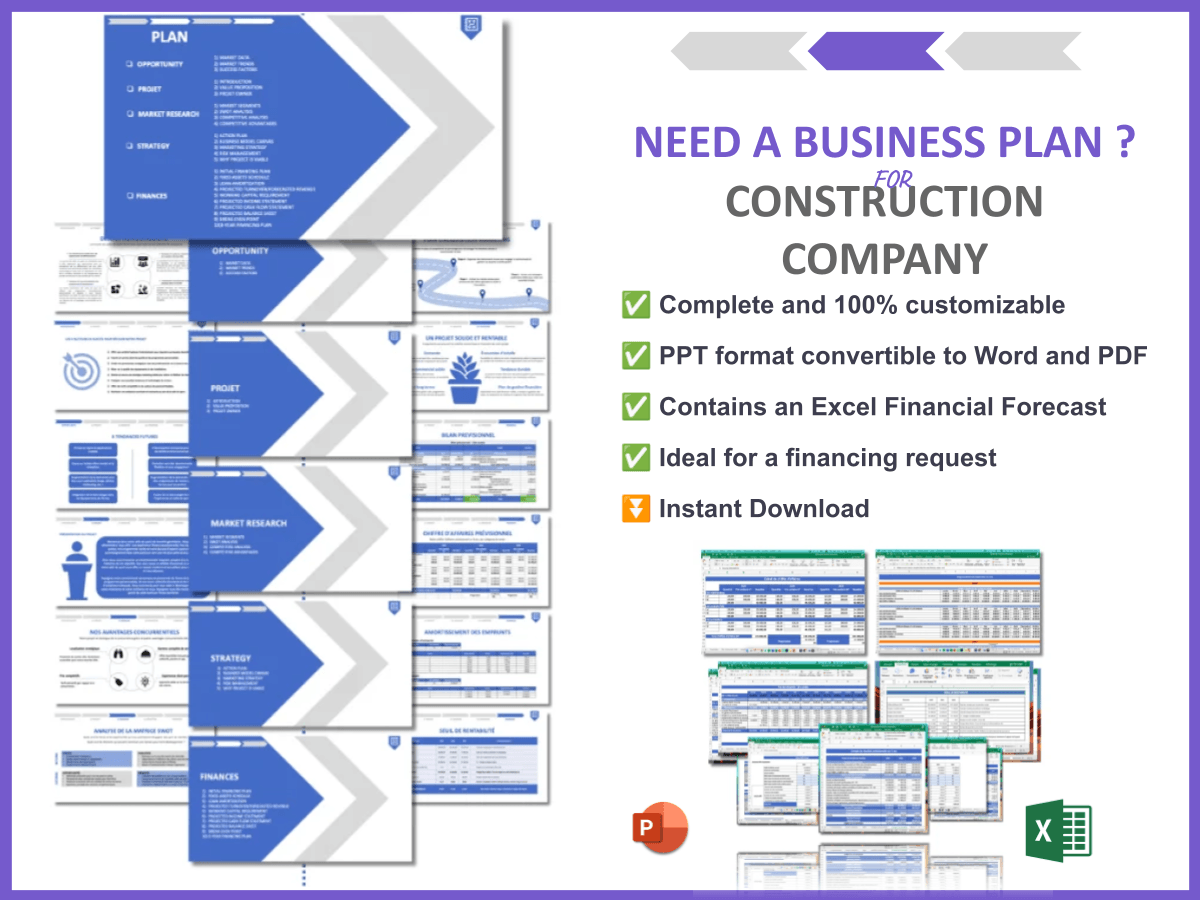Are you thinking about starting your own construction company? You’re not alone! The construction industry has seen a surge in demand, with more people wanting to invest in real estate and renovation projects. In fact, did you know that the construction sector is expected to grow by over 5% annually? This means that now is the perfect time to dive into this lucrative field. Starting a construction company requires careful planning and execution, but with the right steps, you can build a successful business. In this article, we’ll explore everything you need to know about how to start a construction company.
- Identify your niche in the construction industry.
- Conduct thorough market research and competitor analysis.
- Choose a memorable name for your construction company.
- Create a comprehensive business plan for your construction company.
- Decide on the legal structure for your construction company.
- Secure funding and financial resources for your construction company.
1. Identify Your Niche in the Construction Industry
Understanding where you fit in the construction landscape is crucial. Are you looking to focus on residential, commercial, or industrial construction? Each niche has its own challenges and opportunities. Think about what you’re passionate about and where your skills lie.
For example, if you have experience in residential renovations, that might be your best bet. On the other hand, if you’re interested in large-scale commercial projects, you might want to focus your efforts there. Here’s a simple breakdown of different niches:
- Residential Construction: Building homes, renovations, and additions.
- Commercial Construction: Offices, retail spaces, and warehouses.
- Industrial Construction: Factories, plants, and infrastructure projects.
Consider market demand in your area. For instance, if your community is booming with new housing developments, it might be wise to lean into residential construction. Analyze competitor offerings and identify your unique selling proposition (USP). Knowing your niche will help you tailor your services and marketing efforts effectively.
2. How to Start a Construction Company: Market Research and Competitor Analysis
Before jumping in, it’s vital to conduct thorough market research. Who are your competitors? What services do they offer? What are their strengths and weaknesses? Understanding the competitive landscape will help you position your business effectively.
Here’s a simple method to assess your competitors:
- Identify Key Competitors: List out the main players in your area.
- Analyze Their Offerings: What services do they provide? How do they market themselves?
- Evaluate Their Strengths and Weaknesses: What do they do well? Where do they fall short?
To illustrate this, here’s a table that summarizes a hypothetical competitor analysis:
| Competitor | Strengths | Weaknesses |
|---|---|---|
| Competitor A | Established reputation, diverse portfolio | High pricing, limited customer service |
| Competitor B | Fast turnaround, good marketing | Poor quality control, limited experience |
By understanding your competitors, you can identify gaps in the market and tailor your services to meet the needs of potential clients. This research will also inform your marketing strategy and help you develop a brand that stands out in the crowded construction industry.
3. Choose a Memorable Name for Your Construction Company
Your company name is your first impression. It should be catchy, memorable, and relevant to your services. A strong name not only reflects your brand but also helps in attracting potential clients.
When choosing a name, consider the following tips:
- Relevance: The name should convey what your business does. For example, names like “Quality Builders” or “Green Construction” immediately indicate your focus.
- Ease of Spelling and Pronunciation: A name that is easy to spell will help clients find you online and recommend you to others.
- Check Domain Availability: In today’s digital age, having a matching domain name is crucial. Ensure that your chosen name has an available domain for your website.
Once you have a shortlist, get feedback from friends or potential customers. Their perspectives can help you finalize a name that resonates with your target audience. Remember, your company name is a vital part of your brand identity, so choose wisely!
4. Create a Comprehensive Business Plan for Your Construction Company
A solid business plan is essential for success in the construction industry. It serves as a roadmap, outlining your vision, goals, and strategies for achieving them. A well-crafted business plan can also help you secure funding from investors or lenders.
Here are the key components to include in your business plan:
- Executive Summary: A brief overview of your business and its objectives.
- Market Analysis: Research about the construction industry and your target market.
- Marketing Strategy: How you plan to attract clients and build your brand.
- Financial Projections: Detailed forecasts of revenue, expenses, and profitability.
I recommend checking out this business plan template for Construction Company. It’s super detailed and can save you a ton of time!
Here’s a sample table that outlines the financial projections section:
| Year | Revenue | Expenses | Profit |
|---|---|---|---|
| Year 1 | $200,000 | $150,000 | $50,000 |
| Year 2 | $300,000 | $200,000 | $100,000 |
| Year 3 | $450,000 | $300,000 | $150,000 |
This table gives a clear picture of your expected growth and helps you identify potential financial challenges. A comprehensive business plan not only guides your operations but also increases your chances of attracting investors and partners.
5. Decide on the Legal Structure for Your Construction Company
Your business structure affects your taxes, liability, and other legal aspects. Choosing the right legal structure is crucial for the success of your construction company. Common options include:
- Sole Proprietorship: Simple to set up but offers no personal liability protection.
- Partnership: Shared ownership but requires a partnership agreement to outline roles and responsibilities.
- Limited Liability Company (LLC): Provides liability protection while allowing flexibility in management and taxation.
- Corporation: More complex and expensive to set up but offers the strongest protection against personal liability.
It’s wise to consult a legal expert or an accountant to determine the best structure for your specific needs. Consider factors such as the size of your company, your future growth plans, and how you intend to raise capital. Each structure has its pros and cons, so understanding these can help you make an informed decision.
6. How to Start a Construction Company: Securing Funding and Financial Resources
Funding can be a major hurdle when starting a construction company. You’ll need sufficient capital to cover initial costs, including equipment, labor, and materials. Here are some strategies to secure funding:
- Bank Loans: Traditional loans are a common option but require a solid business plan and good credit history.
- Investors: Bringing in partners can provide capital in exchange for equity in the business.
- Personal Savings: Using your savings can be a straightforward way to fund your startup, but it comes with risks.
- Grants: Look for grants specific to the construction industry that do not require repayment.
When approaching lenders or investors, be prepared to present your business plan, including financial projections and how you plan to use the funds. Here’s a sample table that outlines potential funding sources:
| Funding Source | Amount Available | Repayment Terms |
|---|---|---|
| Bank Loan | $50,000 – $500,000 | 5-10 years at 6-8% interest |
| Private Investor | $10,000 – $100,000 | Equity stake, terms vary |
| Grants | $5,000 – $50,000 | No repayment required |
Understanding your funding options will help you navigate the financial landscape and ensure that you have the resources needed to launch your construction company successfully. Always have a clear plan for how you will manage your finances as your business grows.
7. Register Your Business to Make It Official
Once you have your name and legal structure in place, the next step is to register your business. This process is crucial for making your construction company official and allows you to operate legally within your state or locality.
Here are the key steps to register your business:
- Choose Your Business Name: Ensure that your chosen name is not already in use or trademarked. This protects your brand and avoids legal issues.
- File for Registration: Depending on your business structure, you’ll need to file your registration with the appropriate state agency. This could be the Secretary of State or a similar office.
- Obtain a Business License: Most states require a business license to operate legally. Check with your local government for specific requirements.
- Register for Taxes: Apply for an Employer Identification Number (EIN) with the IRS. This number is essential for tax purposes and hiring employees.
By completing these steps, you’ll ensure that your construction company is compliant with all legal regulations, which can save you from potential fines or legal troubles down the road. It’s worth investing the time to get this right from the start!
8. Obtain Necessary Tax Identification Numbers, Licenses, and Permits for Your Construction Company
Operating a construction company requires various licenses and permits to comply with local, state, and federal regulations. Obtaining these can be a complex process, but it’s essential for legal operation.
Here’s a breakdown of what you need to consider:
- Tax Identification Numbers: After registering your business, apply for an Employer Identification Number (EIN) through the IRS. This is necessary for tax purposes and hiring employees.
- Business Licenses: Depending on your location, you may need specific licenses to operate a construction business legally. Research the requirements in your state and locality.
- Permits: Construction projects often require permits, especially for major renovations or new builds. These can include building permits, zoning permits, and environmental permits.
Here’s a simple table that outlines some common licenses and permits you may need:
| License/Permit | Description | Cost |
|---|---|---|
| General Contractor License | Required to perform construction work | $300 |
| Building Permit | Necessary for new construction or major renovations | $100 – $1,000 |
| Zoning Permit | Ensures compliance with local zoning laws | $50 – $500 |
Ensure that you stay updated on any changes to licensing requirements in your area. Failing to obtain the necessary licenses and permits can lead to fines, project delays, or even legal action, so it’s crucial to prioritize this step in your journey of how to start a construction company.
9. Set Up Your Financial Management Systems for Your Construction Company
Efficient financial management is key to staying afloat in the competitive world of construction. A well-organized financial system helps you track income, manage expenses, and plan for future growth. Here are essential steps to set up your financial management:
- Choose Accounting Software: Invest in reliable accounting software tailored for construction businesses. Options like QuickBooks or Xero can help you manage invoices, payroll, and expenses.
- Establish a Budget: Create a budget that outlines your expected income and expenses. This will help you monitor cash flow and make informed financial decisions.
- Open a Separate Business Bank Account: Keeping your personal and business finances separate is crucial for accurate accounting and tax purposes.
Here’s a simple table outlining common financial management tasks and their frequency:
| Task | Frequency | Notes |
|---|---|---|
| Review Financial Statements | Monthly | Monitor profitability and cash flow. |
| Reconcile Bank Accounts | Monthly | Ensure accuracy in your records. |
| Prepare Tax Documents | Quarterly | Stay ahead of tax deadlines. |
Implementing these financial management practices will help you maintain a healthy financial position and avoid potential pitfalls as your construction company grows.
10. Establish Your Brand Identity for Your Construction Company
Your brand identity sets you apart from competitors and communicates your values to potential clients. Building a strong brand is essential for gaining trust and recognition in the construction industry. Here’s how to establish your brand identity:
- Create a Unique Logo: A well-designed logo is the face of your business. It should be simple, memorable, and reflect your company’s values.
- Choose Brand Colors and Fonts: Consistent colors and fonts across all marketing materials help create a cohesive brand image.
- Develop a Brand Message: Craft a clear message that communicates what your company stands for. This message should resonate with your target audience.
To help visualize your brand, consider creating a brand style guide. This document should include guidelines on logo usage, color palettes, typography, and tone of voice. Here’s a quick overview of elements to include in your brand style guide:
| Element | Description |
|---|---|
| Logo Usage | How to use your logo in various formats and backgrounds. |
| Color Palette | Specific colors that represent your brand. |
| Typography | Fonts and styles that align with your brand image. |
Establishing a strong brand identity not only helps you attract clients but also builds loyalty and trust in your services. Remember, your brand is more than just a logo; it’s the entire experience you provide to your customers.
11. Develop a Professional Website for Your Construction Company
In today’s digital world, a professional website is a must for any business, including your construction company. It serves as your online portfolio and can attract potential clients. Here are essential elements to consider when developing your website:
- User-Friendly Design: Ensure your website is easy to navigate, with clear menus and a logical layout. A complicated site can deter potential clients.
- Mobile Responsiveness: With many users accessing websites from their phones, your site should look and function well on all devices.
- Project Galleries: Showcase your previous work with high-quality images and detailed descriptions. This builds credibility and demonstrates your skills.
- Client Testimonials: Positive reviews from past clients can significantly influence new customers. Feature these prominently on your homepage.
Consider including a blog section where you share insights about the construction industry, tips for homeowners, and updates on your projects. This can help improve your website’s search engine optimization (SEO) and establish you as an authority in the field.
Here’s a simple table outlining essential website pages you should include:
| Page | Description |
|---|---|
| Home | Overview of your services and business. |
| About Us | Information about your company, mission, and team. |
| Services | Detailed descriptions of the services you offer. |
| Contact | How potential clients can reach you. |
Having a professional website not only increases your visibility but also builds trust with potential clients. It’s an investment that can pay off significantly in the long run.
12. Market and Advertise Your Services
Once you’re set up, it’s time to spread the word about your construction company. Effective marketing is crucial for attracting clients and growing your business. Here are some strategies to consider:
- Networking: Attend industry events, trade shows, and local business meetings to connect with potential clients and partners. Building relationships is key in the construction industry.
- Online Advertising: Use social media platforms like Facebook, Instagram, and LinkedIn to reach your target audience. Consider paid ads to increase visibility.
- Content Marketing: Share valuable content related to construction, such as tips, guides, and industry news, on your blog and social media. This positions you as an expert and attracts potential clients.
Here’s a quick overview of effective marketing channels for your construction company:
| Marketing Channel | Description |
|---|---|
| Social Media | Engage with customers and showcase projects. |
| Email Marketing | Send newsletters and promotions to potential clients. |
| SEO | Optimize your website to rank higher on search engines. |
By implementing a diverse marketing strategy, you can effectively reach your target audience and grow your construction business.
13. How to Start a Construction Company: Assemble Your Team
Building a successful construction company requires a strong team. The right people can make all the difference in delivering quality work and ensuring client satisfaction. Here’s how to assemble your team:
- Identify Key Roles: Determine which positions are essential for your business, such as project managers, foremen, laborers, and administrative staff.
- Recruit Skilled Workers: Look for individuals with experience in the construction industry. Use job boards, social media, and networking to find qualified candidates.
- Provide Training: Invest in training programs to ensure your team is skilled in the latest construction techniques and safety protocols.
Here’s a breakdown of common roles in a construction company:
| Role | Responsibilities |
|---|---|
| Project Manager | Oversees projects from start to finish, ensuring timelines and budgets are met. |
| Foreman | Supervises on-site workers and ensures compliance with safety regulations. |
| Laborer | Performs physical work on construction sites, including demolition, digging, and site preparation. |
Building a strong team is crucial for the success of your construction company. With the right people in place, you can deliver exceptional results and build a reputation that attracts more clients.
Conclusion
Starting a construction company is an exciting journey filled with opportunities and challenges. By following the steps outlined in this guide, you can lay a solid foundation for your business. From identifying your niche to assembling a talented team, every aspect plays a critical role in your success.
As you embark on this venture, remember that continuous learning and adaptation are key. To further enhance your business strategy, I recommend checking out our articles on how to create a SWOT Analysis for Construction Company and How to Initiate a Construction Company Marketing Plan? With Example. These resources will provide valuable insights to help you navigate the complexities of the construction industry.
With determination and the right tools, you can build a thriving construction business that stands the test of time!
FAQ
- What are the first steps to starting a construction company?
Begin by identifying your niche in the industry, conducting market research, and creating a comprehensive business plan. Understanding your target market is crucial for success. - Do I need a license to start a construction company?
Yes, most states require a general contractor’s license to operate legally. Check your local regulations to determine the specific licenses and permits needed. - How do I fund my construction company?
Consider various funding options such as bank loans, private investors, personal savings, and industry-specific grants. Prepare a solid business plan to present to potential lenders. - What type of insurance do I need for a construction business?
Essential insurance includes general liability, worker’s compensation, and equipment insurance. These protect your business from potential risks and liabilities. - How can I effectively market my construction company?
Utilize a mix of online and offline marketing strategies, including social media advertising, networking, and content marketing to reach your target audience effectively. - What are the legal structures available for a construction company?
The common structures include sole proprietorship, partnership, limited liability company (LLC), and corporation. Each has its own advantages and implications for liability and taxes. - How do I hire skilled workers for my construction company?
Recruit skilled workers through job boards, social media, and industry networking. Consider their experience and qualifications to ensure they fit your company’s needs. - What should be included in a business plan for a construction company?
A business plan should include an executive summary, market analysis, marketing strategy, financial projections, and operational plans. This document guides your business and helps secure funding. - How do I create a brand identity for my construction company?
Develop a unique logo, choose consistent brand colors and fonts, and create a clear brand message that reflects your values and connects with your target audience. - What ongoing training is necessary for construction workers?
Regular training on safety protocols, new construction techniques, and equipment operation is essential to ensure compliance and maintain high standards in your projects.







